#multi vendor ecommerce software
Explore tagged Tumblr posts
Text
From Electronics and Clothing to Food and Pharmaceuticals, Ecommerce is Omnipresent.

In today’s world, it is nearly impossible to think about shopping without ecommerce. It has completely engulfed the entire retail industry. A futuristic retail business cannot afford to remain offline, especially after the pandemic when offline businesses were either forced to exit or face loss. Retail businesses turned to modern advanced technology and went online which not only kept them afloat but also brought sales and profit.
One can find almost all the desired products online on his ecommerce marketplace app. With just a few clicks or touches, a customer can enter into the world of online shopping where multiple vendors display their digital catalogue and place orders smoothly. All this has been made possible due to the power of multi vendor marketplace software that is delivering multiple benefits to the stakeholders involved in online shopping.
Multiple vendors on the same platform: Instead of having dedicated ecommerce software for each vendor to display their products, online marketplace software allows them to use one single platform to sell their items. Amazon and Flipkart are the best examples. A new vendor on the platform doesn’t have to invest heavily in marketing as he gets an already built customer base in the marketplace.
A variety of products: Due to the availability of multiple vendors on a single platform, the customers don’t have to jump from one platform to another in order to find the best products at the best price. They can find everything on the same platform thereby, reducing their efforts and saving their precious time.
Super fast delivery: Timely delivery has become a major factor in determining the success of any online business. Failing to deliver the product in the stipulated time, spoils the shopping experience of the customer. Keeping note of this, the multi vendor marketplace software has brought end-to-end automation in the entire ordering and delivery process. For instance, the delivery agent can find the optimized delivery route on their driver app in order to contribute to achieving quick commerce.
The ease of uploading items: With the help of the vendor’s dedicated merchant app, the sellers can upload items in bulk ranging from electronics and clothes to food and pharmaceuticals in just a click or touch. This makes the work of sellers easy. Also, the ease of product upload helps the customers in finding a variety of items on a marketplace.
In the eCommerce Market, the number of users is expected to amount to 2.5bn users by 2028. User penetration will be 29.7% in 2023 and is expected to hit 34.1% by 2028. Going through the data above, it is evident that ecommerce is omnipresent and is going to exist for a long time. Thus, prudent businesses will be ones that will walk along with the advancing technology.
#quick commerce#q commerce#ecommerce marketplace#multi vendor ecommerce#multi vendor marketplace software#multi vendor marketplace#multi vendor ecommerce software
0 notes
Text
Integrating E-Commerce Solutions across Websites and Apps for Multi-Platform Selling
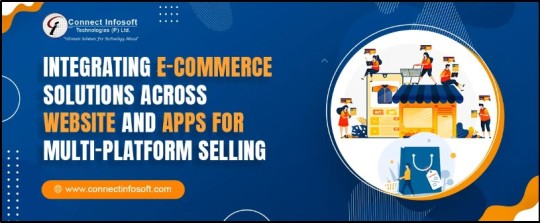
In digital age, e-commerce has become an integral part of the retail industry. With the rapid growth of online shopping, businesses are constantly seeking ways to expand their reach and maximize their sales potential. One effective strategy that has emerged is multi-platform selling, which involves integrating e-commerce solutions across websites and apps to create a seamless shopping experience for customers.
Without a doubt, selling across various platforms is a game changer in the realm of custom eCommerce development, with the potential to propel any organization to new heights. This blog will look at all aspects of multi-platform selling and how it affects the modern eCommerce business scene. Let us get started.
eCommerce Evolution: A New Era of Online Selling
Welcome to the new era of online selling! With the ever-growing popularity of e-commerce, businesses are constantly seeking ways to expand their reach and increase their sales. One such method that has gained significant traction is multi-platform selling, which involves integrating e-commerce solutions across websites and apps.
However, because consumer behaviours and market demands change so quickly, an all-in-one or single eCommerce strategy is insufficient for long-term success. This is where multi-platform selling provides numerous chances for firms looking to increase engagement and diversify their reach.
What Does Multi-Platform Selling Mean?
Multi-platform selling refers to the practice of selling products or services through multiple online channels simultaneously. This approach allows businesses to reach a wider audience and cater to customers' preferences across various platforms, including websites, mobile apps, social media platforms, and marketplaces. By offering a consistent shopping experience across different channels, businesses can enhance customer engagement, increase brand visibility, and boost sales.
Whether you run a little business or a large corporation, if you carefully position your company on these platforms, you will meet all of your customers' expectations by providing a convenient purchasing experience. However, managing sales across several channels is not as simple as it appears; a custom eCommerce development solution is required to optimize the process.
Major Perks of Multi-Platform Selling
There are several significant perks associated with multi-platform selling. Let's take a closer look at some of the major advantages that businesses can enjoy:
1. Expanded Reach: By leveraging multiple platforms, businesses can tap into a larger customer base and target diverse demographics. This broadens their reach and increases the chances of attracting new customers.
2. Enhanced Customer Experience: Multi-platform selling enables businesses to provide a seamless and consistent shopping experience across various channels. Customers can browse products, make purchases, and access support services conveniently, regardless of the platform they prefer.
3. Increased Sales Opportunities: With multiple channels at their disposal, businesses have more opportunities to showcase their products and services and convert leads into sales. Each platform serves as an additional sales channel, increasing the chances of generating revenue.
4. Improved Brand Visibility: Businesses may increase brand awareness and familiarity by maintaining a presence across many media. Consistent branding across channels promotes client trust and loyalty.
5. Better Data Insights: Multi-platform selling allows businesses to gather data from different sources, providing valuable insights into customer behaviour, preferences, and trends. This data can be used to optimize marketing strategies, personalize customer experiences, and drive informed business decisions.
Other key benefits of multi-platform selling include:
Improved conversion rate
Better customer loyalty.
Improved inventory transparency.
Improved customer segmentation.
Mobile commerce trend capitalization
Best Platforms for Multi-Channel eCommerce Business
1. Shopify: Shopify offers a comprehensive e-commerce platform that allows businesses to create and manage online stores. It provides seamless integration with various sales channels, including websites, mobile apps, social media platforms, and marketplaces.
2. Magento: Magento is a highly flexible and scalable e-commerce platform that caters to businesses of all sizes. It supports multi-channel selling by integrating with multiple platforms, enabling businesses to sell across websites, mobile apps, and marketplaces.
3. Etsy: If you want to sell antique, handcrafted, craft supplies, or other one-of-a-kind things online, Etsy is a great place to start. Users may easily access a wide range of product categories on this marketplace, including clothing, jewellery, tools, home, living, kids & babies, and entertainment.
4. Amazon Marketplace: As one of the largest online marketplaces, Amazon provides businesses with a vast customer base and global reach. Selling on Amazon Marketplace can significantly expand the visibility and sales potential of products.
5. eBay: eBay is another popular online marketplace that allows businesses to sell products to a wide range of customers. With its auction-style listings and fixed-price options, eBay offers flexibility for multi-channel selling.
6.Walmart Marketplace: Walmart is a frequently used marketplace that provides excellent prospects for online enterprises. This is a curated e-commerce portal. As a seller, you must meet specified requirements for providing excellent customer service.
7. Facebook Marketplace: This is Facebook's integrated platform that provides fantastic online selling choices to local sellers and small enterprises. This platform is simple to use and helps you promote your goods to a social media-savvy customer audience.
How to Set Up a Successful Multi-Platform Selling Strategy:
1. Identify Target Platforms:
Research and analyse the platforms that align with your target audience and business objectives. Consider factors such as platform popularity, user demographics, and integration capabilities.
2. Seamless Integration:
Select e-commerce platforms that offer robust integration capabilities with various channels. Ensure that your chosen platforms can synchronize product listings, inventory, pricing, and order management across all channels.
3. Consistent Branding:
Maintain consistent branding elements, such as logo, colors, and messaging, across all platforms. This creates a cohesive brand identity and fosters customer recognition and trust.
4. Optimize User Experience:
Provide a user-friendly and intuitive shopping experience on every platform. Optimize website and app performance, ensure mobile responsiveness, and streamline the checkout process to minimize friction and maximize conversions.
5. Data-Driven Decision Making:
Leverage analytics and data insights to monitor and measure the performance of each platform. Identify trends, customer preferences, and areas for improvement, and use this information to refine your multi-platform selling strategy.
6. Customer Support:
Offer consistent and responsive customer support across all platforms. Provide multiple channels for customer inquiries, such as live chat, email, and phone, to ensure a seamless support experience.
7. Cross-promotion:
Cross-promotion is a marketing strategy where two or more parties promote each other's products or services to their respective audiences. It's a mutually beneficial arrangement that can help increase brand exposure, reach new customers, and drive sales.
8. Privacy and Data Security:
- Manage all of your customers' data safely.
- Display all privacy policies to your customers to develop trust.
9. Focus on market trends.
- Keep up with the latest industry developments, platform updates, and client requests.
- Be prepared to change your business approach (if necessary) to stay ahead of the market.
Conclusion:
Multi-platform selling has become a crucial strategy for businesses aiming to thrive in the competitive e-commerce landscape. By integrating e-commerce solutions across websites and apps, businesses can expand their reach, enhance the customer experience, and boost sales. With the availability of various platforms, businesses can choose the ones that align with their target audience and business goals. By implementing a well-planned multi-platform selling strategy, businesses can establish a strong presence across multiple channels, drive customer engagement, increase brand visibility, and ultimately achieve success in the evolving world of e-commerce.
#Multi-Vendor E-Commerce Market Place Software#Best Multi-Channel Listing Software Solutions For Ecommerce Sellers#ECommerce Management Solution#ECommerce Product Management#Best ECommerce Software#Multi-Channel Selling Software#Shipping Software#Multi-Channel eCommerce Inventory Management Software#Product Listing Software#Multichannel Marketplace Software#Connect Infosoft#E-commerce website development#E-commerce website optimization#Mobile commerce optimization#Mobile commerce solutions#Multi-channel sales management
0 notes
Text
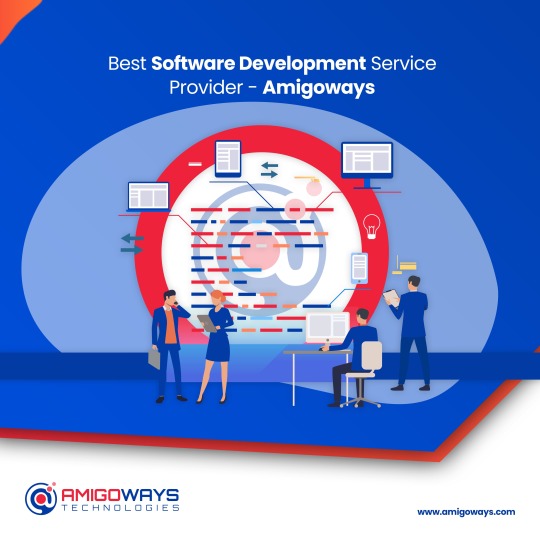
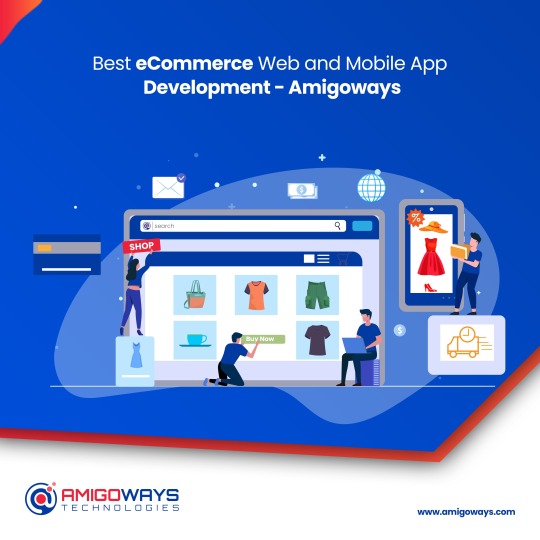
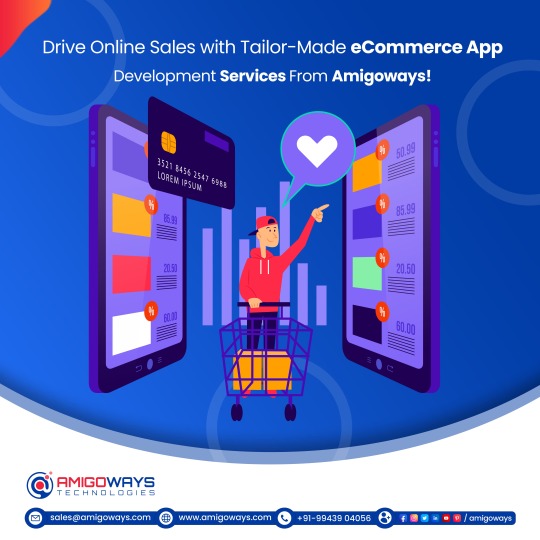
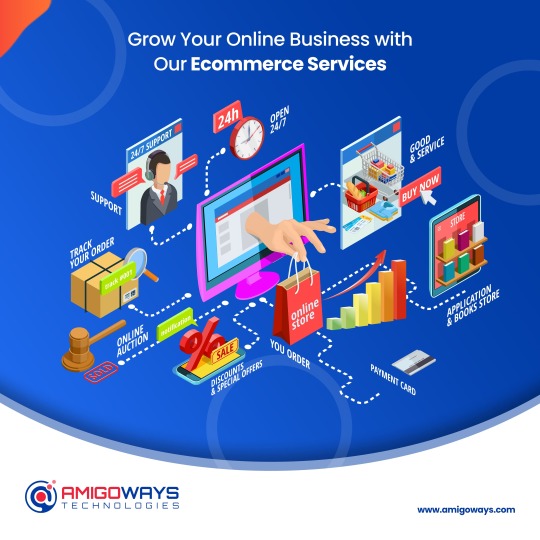
Top eCommerce Development In Tamil Nadu
Amigoways is one of the most trusted eCommerce development company in Madurai, We offer effective and successful eCommerce website & extension development for all types of B2B & B2C organizations. Amigoways is a team of well-trained, certified tech professionals who structure your venture with a business suite. Our multitude of services for your business upliftment on the business market.
Our eCommerce Development Services
Custom ECommerce Development
API Integration & Customization
Data Maintenance & Migration
ECommerce Audit & Optimisation
ECommerce Data Analytics
ECommerce Consulting
Business Intelligence
To know more about eCommerce development services Tap on - https://www.amigoways.com/ecommerce-development/
#ecommerce website development in madurai#Multi Vendor eCommerce Services in Tamil Nadu#top Multi Vendor eCommerce Services in Tamil Nadu#b2b ecommerce software solutions in madurai#multi vendor clone script madurai
0 notes
Text
Advantages of a Multi-Vendor Marketplace | Laravel E-commerce
In the realm of eCommerce, the concept of a multi-vendor marketplace stands as a beacon of opportunity, offering an all-in-one shopping experience where a diverse array of products and services converge under a single digital roof. These marketplaces, exemplified by industry giants like Amazon and Flipkart, open wide avenues for various sellers to showcase their offerings, effectively expanding their reach and boosting their revenue streams.

Understanding the Multi-Vendor Marketplace Business Model
At first glance, the concept of establishing a multi-vendor marketplace might appear complex. However, it’s far more manageable than it seems. The fundamental goal of vendors and merchants within such a platform is simple: to drive sales. Each participant plays a unique role in achieving this goal.
Vendors take charge of vital aspects such as sales management, order processing, product listings, inventory management, and shipping logistics. Meanwhile, service providers focus on devising innovative strategies to bolster brand recognition and drive revenue growth.
The operation of a multi-vendor marketplace involves several critical steps, whether you intend to launch a specialized fashion boutique, a designer jewelry hub, or an all-encompassing marketplace akin to Flipkart or Snapdeal. Vendors can easily register on the platform, manage their product catalogs, oversee purchases, and maintain control over their operations through a unified dashboard.
When customers place orders, transactions are seamlessly facilitated through the platform, with merchants collecting a nominal commission fee for each successful sale. Vendors also shoulder the responsibility of addressing customer inquiries and resolving any complaints, as well as handling packaging and shipping processes.
The Rising Demand for Multi-Vendor Marketplaces
In contrast to single-vendor stores that exclusively offer their own products, multi-vendor marketplaces present a treasure trove of choices from various brands and product categories, meeting the diverse needs of customers all in one place. This inherent versatility makes multi-vendor marketplaces an enticing prospect for entrepreneurs looking to capitalize on the retail landscape.
Embarking on Your Multi-Vendor Marketplace Journey
But how can you start your very own multi-vendor marketplace? The answer lies in your approach. You can embark on this venture either from scratch or with the assistance of marketplace software.
Developing a multi-vendor platform from scratch demands substantial investments in terms of both time and financial resources. It necessitates the expertise of a skilled design and development team. However, this custom approach offers unparalleled flexibility.
Alternatively, you can opt for ready-made marketplace software, which provides a cost-effective and time-efficient solution. These platforms streamline the development process, enabling you to launch your marketplace more swiftly and with reduced expenses.

Benefits of Embracing the Multi-Vendor Marketplace Model
The multi-vendor marketplace model offers a multitude of benefits to sellers, marketplace owners, and consumers alike:
Sellers can rapidly expand their customer base on a global scale.
Vendors save on the costs and efforts associated with developing standalone applications, simply by signing up and listing their products.
Real-time inventory tracking and order management capabilities ensure timely order fulfillment and inventory control.
Marketplace owners can amass a broad clientele thanks to the extensive product range offered on their platform.
Owners can focus on enhancing vendor visibility, unburdened by the day-to-day operations of individual vendor shops.
The multi-vendor marketplace model provides diverse revenue streams, offering owners the potential for substantial earnings from a single platform.
Leveraging Laravel Ecommerce for Success
For those seeking a reliable software solution to build a promising multi-vendor marketplace, Laravel ecommerce emerges as an excellent choice. This comprehensive package boasts an array of features, including support for multiple payment gateways, advanced search functionality, robust store management tools, responsive customer support, multilingual options, and much more.
In conclusion, there has never been a better time for entrepreneurs to invest in the lucrative world of multi-vendor marketplaces. These platforms offer a gateway to multiple revenue channels and the potential for substantial profits in the dynamic eCommerce landscape.
#ecommerce#ecommerce clone scripts#laravel ecommerce store#laravel ecommerce system#laravel multivendor ecommerce#multi vendor laravel ecommerce#laravel ecommerce software#laravel ecommerce#laravel rental system#Ecommerce software#ecommerce marketplace software
0 notes
Text
Online Multi-Vendor Platform for B2B or B2C Marketplaces
FlightsLogic is the best B2B eCommerce multi-vendor marketplace platform with a wide list of all essential eCommerce features, expert technical support, ability to customize, highly scalable, and more. The platform offers a complete package to kick-start your B2B marketplace and streamline eCommerce operations.
Our fully customizable multi-vendor eCommerce solution allows for selling multiple products through a single storefront and customers can add products from different vendors to their single shopping cart. The site admin can set up shipping regulations, modify products in the marketplace, and add new sellers or vendors.
FlightsLogic is a self-hosted multi-vendor software for marketplaces suitable for both startups as well as enterprises. The on-premise platform is fully scalable, easy to customize, and follows agile methodologies to help you gain a competitive edge. & Amazon Business, Alibaba, Rakuten, IndiaMart, and Global Sources are the top five B2B eCommerce marketplaces globally.
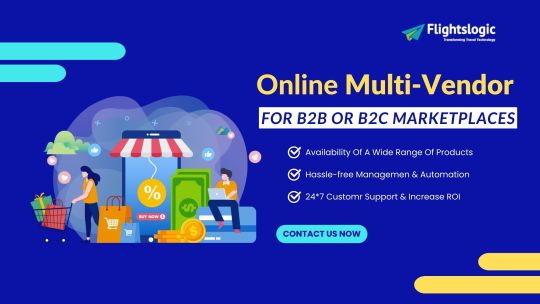
Our multi-vendor eCommerce marketplace development services cater to eCommerce businesses of all sizes to set up and manage marketplaces quickly, affordably, and efficiently, along with a focus on providing full control over your eCommerce store’s functionality.
FlightsLogic powered B2B Marketplace Website Software Solution comes in handy by providing you a platform to aggregate vendors, and buyers at the same place and manage the selling process effectively.
Multi-vendor marketplace software comes with powerful features including an easy-to-use interface, simple payment methods, social media integrations, rewards and discounts, ratings and reviews, and more. You can start small by taking a conservative approach and opting for an MVP. It is a minimalistic version of your B2B eCommerce marketplace. An MVP enables you to gauge the response of your target audience and pinpoint the flaws that could be detrimental at a later stage.
At FlightsLogic, we develop data-driven online marketplace solutions to help our clients establish a strong market presence. We offer the best set of features at competitive pricing. Our solutions deliver the perfect price-to-functionality ratio and this enables our clients to test their online B2B marketplace idea in the real world at an affordable price.
0 notes
Text
Top 10 ERP Software for Engineering Industry
In the contemporary and dynamic commercial environment, the engineering sector in India is confronted with a diverse range of obstacles, including intense competition, increasing client expectations, intricate project administration, and resource allocation optimisation. In the contemporary era of technology, the utilisation of Enterprise Resource Planning (ERP) software has become an essential and irreplaceable instrument for engineering firms aiming to optimise their operational processes, improve productivity, and foster long-term and sustainable expansion. Boost your engineering company's efficiency with cutting-edge ERP software – STERP software offered by STERP (Shanti Technology) – one of the most trusted firms offering ERP software for engineering companies in Mumbai. Take the first step towards success today with STERP!
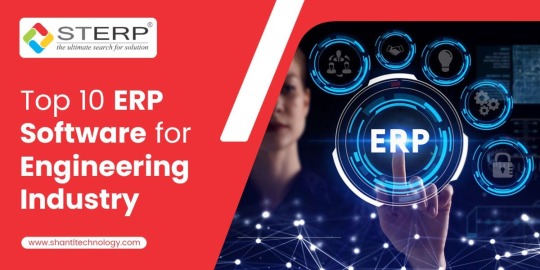
This blog article offers a comprehensive examination of the ten leading enterprise resource planning (ERP) software packages specifically designed to cater to the distinct requirements of the engineering sector in India. The aim is to assist organisations in making well-informed choices that will contribute to their future success.
· STERP Software:
STERP Software is a cutting-edge ERP solution offering an array of features to streamline business operations. It excels in location tracking, task management, and mobile user visit reports. Additionally, it enables seamless tracking of finished goods progress and efficient document management. ISO audit reports and vendor ratings ensure compliance and supplier assessment. The dynamic dashboard provides real-time insights, while multi-currency support facilitates global transactions.
The export documents feature simplifies international trade, and auto-email & SMS integration enhances communication. Quotation lost analysis ratio aids in optimizing sales strategies. Depreciation calculation and auto JV streamline accounting. Moreover, it's Android & iOS mobile app enables easy on-the-go access, including component process tracking.
· Tally.ERP 9:
Tally.ERP 9 is a highly renowned and extensively utilised enterprise resource planning (ERP) software in India, serving a diverse range of businesses, including engineering enterprises, irrespective of their scale or magnitude. Tally.ERP 9 offers comprehensive financial management, inventory control, and taxation modules that enable engineering organisations to adhere to Indian accounting rules and effectively handle financial data management.
· Oracle NetSuite:
Oracle NetSuite is a cloud-based enterprise resource planning (ERP) software that offers a cohesive platform, encompassing ERP, customer relationship management (CRM), and electronic commerce (eCommerce) capabilities. The software's adaptability and capacity to accommodate the needs of engineering businesses of varying sizes in India allow for the optimisation of operations and the acquisition of significant knowledge regarding their business procedures.
· Microsoft Dynamics 365 ERP:
Microsoft Dynamics 365 is a multifaceted enterprise resource planning (ERP) solution that encompasses several functionalities like financial management, supply chain operations, and project accounting. By incorporating localization capabilities specifically designed for India, the software enables engineering organisations to effectively streamline their processes, adhere to regulatory standards, and improve overall client satisfaction.
· Ramco ERP:
The Ramco ERP system has been specifically developed to cater to the distinct needs and demands of the engineering sector within the Indian market. The inclusion of modules pertaining to project management, asset management, and production planning facilitates the attainment of operational excellence and the stimulation of growth within engineering enterprises.
Empower your engineering firm with advanced ERP tools offered by STERP – one of the renowned ERP solution providers in Mumbai. Get a free consultation to discover how!
· EPPS ERP:
The EPPS ERP is a software solution originating from India that has been specifically designed to cater to the needs of the engineering industry. The EPPS ERP system offers a comprehensive range of modules that encompass several aspects of project management, including project planning, procurement, and quality control. By leveraging these modules, firms can effectively streamline their project management processes while upholding stringent quality standards.
· Marg ERP 9+:
Marg ERP 9+ is widely favoured among small and medium-sized engineering enterprises in India. The programme provides a wide range of capabilities, encompassing inventory management, order processing, and adherence to GST legislation, so facilitating operational efficiency and ensuring compliance with local legal requirements for enterprises.
· Infor CloudSuite Industrial (SyteLine):
Infor CloudSuite Industrial, previously recognised as SyteLine, is a comprehensive enterprise resource planning (ERP) solution that specifically caters to the needs of process manufacturing and job shop industries. Its suitability for engineering firms in India lies in its ability to effectively manage different production requirements.
· Focus i:
Focus i is an ERP software that has been designed in India specifically to address the distinct requirements of the engineering industry in the country. Focus i is a software solution that offers several functionalities, including project management, production planning, and HR management. This comprehensive suite of tools enables engineering organisations to enhance their operational efficiency and financial performance.
Optimize your engineering projects and increase profitability. Get ERP solutions offered by top ERP for manufacturing company in Mumbai – STERP (Shanti Technology).
· Reach ERP:
Reach ERP is a nascent participant in the Indian enterprise resource planning (ERP) industry, specifically tailored to cater to the needs of small and medium-sized engineering enterprises. The cloud-based design of this system, in conjunction with its various capabilities such as inventory control, order management, and financial accounting, facilitates efficient operational administration for organisations.
Final Thoughts:
The pursuit of efficiency, innovation, and sustainable growth holds significant importance in India's engineering business. The adoption of digital transformation within the industry has led to the recognition of ERP software as a crucial facilitator. This software plays a significant role in assisting engineering companies in optimising their operations, enhancing the efficient allocation of resources, and ultimately improving customer satisfaction. The aforementioned list comprises the top 10 enterprise resource planning (ERP) software systems that are tailored to address the unique requirements of the engineering sector in India. These software solutions offer a wide range of comprehensive features and functionalities, specifically designed to effectively address the many difficulties and opportunities prevalent in the market.
When making a decision on the choice of an Enterprise Resource Planning (ERP) system, engineering businesses should take into account many variables like scalability, localization capabilities, simplicity of integration, and vendor support. Gain a competitive edge in Mumbai's engineering sector - Implement effective ERP solution offered by STERP (Shanti Technology) – one of the distinct ERP software providers in Mumbai! The use of Enterprise Resource Planning (ERP) technology represents a strategic decision that holds the potential to bring about dramatic changes within the engineering industry in India.
#ERP software for engineering companies in Mumbai#ERP solution providers in Mumbai#ERP for manufacturing company in Mumbai#ERP software providers in Mumbai#ERP software#technology#ERP system#cloud ERP#ERP solutions#manufacturer#engineering#business process#management software#business analytics#engineering industry
5 notes
·
View notes
Text
Affordable White Label Software London | CRM, eCommerce, Booking & More
Many London businesses are seeking affordable ways to get powerful, customizable software. With a crowded market, standing out means choosing flexible solutions that fit your brand. White label software London offers a simple, cost-effective way to do that. It lets you put your logo and style on ready-made tools, saving time and money. Whether you need a CRM, eCommerce platform, booking system, or other solutions, white label options are available that keep quality high without breaking the bank.
Why Choose White Label Software in London?
Growing Business Opportunities in London
London is a hub for startups, small firms, and big enterprises alike. The city’s fast pace pushes companies to adopt new tech quickly. Today, London’s tech scene grows rapidly, with countless new businesses opening each year. According to recent data, the number of digital startups in London skyrocketed by 20% in the last two years. Such growth means the demand for customizable software keeps rising too.
Cost-Effective Solutions for SMEs
For small and medium-sized businesses, building custom software from scratch can cost a fortune. White label products offer a cheaper way to get powerful tools that do the job. You can use pre-made software tailored for your needs, then add your branding. Londons’ firms already save thousands by choosing white label software London instead of coding from zero. Case studies show that local companies in hospitality, retail, and service sectors succeed using these solutions while staying within tight budgets.
Flexibility and Branding Control
One of the biggest perks? Full control over your brand. White label software lets you customize colors, logos, and layouts. This helps your business look consistent across all customer touchpoints. Simple tweaks can make the interface match your style perfectly, creating a trusted experience for your clients. It’s a way of making a powerful tool truly your own, without the hassle of building from scratch.
Key Types of Affordable White Label Software
Customer Relationship Management (CRM)
Features to Look For
Good CRMs improve how you manage contacts, automate tasks, and analyze customer data. Key features include contact lists, automated follow-ups, sales tracking, and reporting dashboards. Look for solutions offering integrations with email and marketing tools too.
Popular Solutions in London
Many London-based firms turn to affordable CRMs like Bitrix24, Freshsales, or Zoho CRM. They offer extensive customization and support without heavy costs. These options are ideal if you want to scale as your business grows.
eCommerce Platforms
Features and Benefits
A reliable white label eCommerce system should handle product uploads, payment options, and mobile-friendly design. It should also support multiple currencies and shipping options. This makes it easy to run a full online store with minimal fuss.
Leading Affordable Options
Platforms like Shopify Plus, BigCommerce, or local providers like LemonStand are popular in London. They often come with pre-built themes and easy integration with local payment gateways. Plus, some vendors offer ongoing support tailored for UK businesses.
Booking and Appointment Systems
Features to Consider
Good booking tools sync with calendars, send reminders, and process payments. This streamlines scheduling for hotels, salons, consultants, and more. Features like automated confirmations and multi-user access matter too.
Cost-Effective Solutions
Popular whitelabel Software London booking systems include Acuity Scheduling, SimplyBook.me, and Vagaro. Many of these platforms offer flexible plans suitable for small London firms. They can be branded to fit your business image perfectly.
Additional White Label Solutions
Other options include marketing automation tools, helpdesk platforms, and project management apps. These tools support all parts of your business, from email campaigns to customer support and team collaboration. They help make your processes smoother and more professional.
Selecting the Right Affordable White Label Software Provider in London
Factors to Consider
Choosing the right provider depends on pricing, features, and support. Look for flexible payment plans, options to scale up, and helpful customer service. Check if they easily connect with your existing tools too.
Evaluating Quality and Reliability
Read user reviews and case studies before making a choice. Ask for a demo to see how easy it is to use and customize. Reliable vendors will showcase clear results and happy clients.
Local Support and Community
It helps if the vendor is based in London or nearby. Local support means quicker onboarding and faster help when issues arise. Also, local tech meetups and networks can connect you with experienced users who offer advice and tips.
Implementation Tips for Cost-Effective Success
Planning and Customization
Start with clear goals. Know exactly what you want your software to do and how it should look. Make sure it aligns with your brand to create a consistent customer journey.
Training and Support
Ensure your team understands how to use new tools. Use vendor resources like tutorials, webinars, or support lines to make onboarding easier. Proper training ensures everyone adopts the software quickly.
Monitoring and Optimization
Regularly check how the software performs. Collect feedback from users, and don’t hesitate to update and refine the system. Continuous improvement helps you get the most from your investment.
Conclusion
Affordable white label software London offers a smart way for London businesses to grow fast without big expenses. By choosing the right tools and providers, you can boost your brand, improve customer experience, and stay competitive. Focus on selecting high-quality solutions that fit your needs and support growth. Keep an eye on new options and stay connected with local tech vendors who understand London’s market. With smart moves, your business can enjoy the benefits of tailored software, all while saving money and time. Explore white label options today and unlock new growth opportunities. Visit more information for your website
0 notes
Text
Can your retail business afford to remain offline?

Since the leapfrogging progress of technology in the last century, one cannot imagine the growth of a business without the support of cutting edge tools.
Technology has not only produced out of the box tools like smartphones and high speed internet for the convenience of consumers but also turned out to be a growth booster for businesses.
Retail industry is among the industries that cannot imagine its growth in the modern era without the support of technology. Ecommerce, introduced to the world at the turn of the last century, is the online buying and selling of goods that took the retail industry to another level.
Ecommerce delivered unparalleled convenience to both the consumers as well as other stakeholders involved in it. Consumers could place orders while sitting at their homes and workplaces, and get them delivered at their desired location. Similarly, businesses could easily increase their customer base and thereby, profit while selling through multi vendor ecommerce software.
Due to further progress in technology, consumers are getting more addicted to the local delivery software that is able to help businesses achieve quick commerce. Today, quick commerce has become the most desired thing among the consumer and retail businesses because of making 10 minutes delivery a possibility. Businesses failing to go online will not be able to realize its far-reaching benefits.
As per Statista, revenue in the eCommerce market is projected to reach US$3.64tn in 2023 and is expected to show an annual growth rate (CAGR 2023-2027) of 11.17%, resulting in a projected market volume of US$5.56tn by 2027. The number of users in this market is expected to amount to 5.3bn users by 2027.
#quick commerce#ecommerce marketplace#q commerce#multi vendor ecommerce#multi vendor marketplace platform#multi vendor marketplace#multi vendor ecommerce software#local delivery solution#local delivery software#local delivery service
0 notes
Text
Software-defined Anything Market Future Demand and Evolving Business Strategies to 2033
The rise of cloud computing, virtualization, and AI-driven automation has ushered in a new era of data center and infrastructure management — one defined not by hardware, but by software. This evolution is embodied in the growing global market for Software-defined Anything (SDx), a collective term for software-driven solutions that decouple hardware functionality from the physical layer and enable unprecedented flexibility, scalability, and efficiency across IT environments.
As digital transformation becomes a central strategic goal for organizations worldwide, SDx is expected to be one of the most transformative trends shaping the future of computing and network architecture over the next decade.
Market Overview
The Software-defined Anything (SDx) market refers to technologies that replace hardware-defined infrastructure functions (such as storage, networking, and data center management) with software-based solutions, creating programmable, agile, and automated IT environments.
From software-defined networking (SDN) to software-defined storage (SDS), and even software-defined data centers (SDDC), SDx solutions empower organizations to dynamically adapt and optimize their IT infrastructure based on business needs rather than hardware limitations.
In 2023, the global SDx market was valued at approximately USD 62 billion, and it is projected to grow at a robust CAGR of 23.5%, reaching over USD 265 billion by 2032. This remarkable growth is being driven by rising demand for flexible IT frameworks, increasing cloud adoption, and the explosive growth in data generation from Internet of Things (IoT) devices, 5G networks, and artificial intelligence applications.
Download a Free Sample Report:-https://tinyurl.com/4ax6wfj6
Key Drivers of Market Growth
1. Demand for IT Agility and Flexibility
Traditional hardware-based infrastructures often struggle to keep up with the rapid pace of digital business. Enterprises increasingly require agile, adaptable systems that can be provisioned, scaled, and optimized on the fly.
SDx solutions enable:
Reduced hardware dependency.
Dynamic resource allocation.
Automated policy-based management.
Seamless cloud-native integration.
This agility is invaluable for companies undergoing cloud migration, digital transformation, or global expansion.
2. Data Center Modernization
As businesses increasingly shift workloads to hybrid and multi-cloud environments, the need for software-defined data centers (SDDC) has become urgent. SDDCs allow organizations to virtualize and manage compute, storage, and networking resources from a centralized, software-based control plane.
This trend is particularly prominent in:
Banking and financial services (BFSI).
Healthcare IT.
Retail and eCommerce.
Manufacturing industries deploying Industry 4.0 technologies.
3. 5G Rollout and Edge Computing
The advent of 5G networks and edge computing creates a new set of demands for real-time data handling, traffic routing, and software-defined resource management. Telecom providers and enterprises alike are investing in SDN and Network Function Virtualization (NFV) to improve scalability and reliability at the network edge.
4. Cost Optimization
SDx minimizes the reliance on proprietary, vendor-locked hardware, leading to substantial cost savings for enterprises. By using commodity hardware and overlaying it with intelligent software systems, organizations can:
Reduce capital expenditure (CapEx).
Minimize operational expenditure (OpEx) via automation.
Streamline IT maintenance and upgrades.
Challenges in the Market
While SDx promises many benefits, the road to adoption is not without obstacles:
Security Concerns: Virtualizing hardware functions can create complex attack surfaces if security is not built into the software layer.
Integration Issues: Migrating from legacy hardware to SDx platforms often requires substantial re-engineering of existing systems.
Skill Shortage: A lack of experienced personnel trained in SDN, SDS, and cloud-native architectures remains a major adoption hurdle.
Market Segmentation
By Component
Software: Controllers, hypervisors, and management platforms.
Services: Consulting, implementation, training, and maintenance.
By Type
Software-defined Networking (SDN)
Software-defined Storage (SDS)
Software-defined Data Center (SDDC)
Software-defined Security (SDSec)
Software-defined Wide Area Network (SD-WAN)
Each category is expected to see robust growth, with SD-WAN and SDDC solutions leading the charge due to enterprise cloud adoption.
By End-user
IT and Telecom
BFSI
Retail and eCommerce
Manufacturing
Healthcare
Government and Public Sector
Telecom and IT will dominate the market share due to 5G deployment and network virtualization, but healthcare and manufacturing are catching up as they digitize core processes.
Regional Insights
North America
North America leads the SDx market, thanks to early adoption of cloud services, strong demand for data center modernization, and the presence of key technology providers. The U.S. market is particularly robust, driven by its advanced tech ecosystem and heavy investment in AI and edge computing.
Europe
European enterprises are actively transitioning toward hybrid cloud and software-defined infrastructure to meet evolving data privacy and security regulations (such as GDPR). Germany, the UK, and France are the leading markets.
Asia-Pacific
The Asia-Pacific region is the fastest-growing SDx market. Rapid digitalization, growing mobile connectivity, and government-backed cloud initiatives in China, India, Japan, and Southeast Asia are accelerating market growth.
Industry Trends
1. AI-powered Infrastructure Automation
AI is playing a growing role in SDx by enhancing predictive maintenance, self-healing systems, anomaly detection, and policy-based automation. AI-powered SDx systems reduce downtime and improve resource utilization.
2. Hybrid Cloud and Multi-Cloud Strategies
As enterprises distribute workloads across private clouds, public clouds, and on-premises data centers, software-defined frameworks allow centralized control, seamless orchestration, and dynamic resource scaling.
3. Zero Trust Security Models
Software-defined security systems are enabling Zero Trust Architecture (ZTA), where all users, devices, and services must continuously authenticate, regardless of their network location. This is becoming standard practice as cybersecurity threats grow in complexity.
4. Containerization and Kubernetes Integration
Software-defined infrastructure increasingly integrates with container orchestration platforms like Kubernetes, allowing developers to deploy and manage applications more efficiently, particularly in microservices-driven environments.
Competitive Landscape
The Software-defined Anything market is highly competitive, characterized by a mix of established tech giants and innovative startups.
Leading companies include:
VMware, Inc.
Cisco Systems
Hewlett Packard Enterprise (HPE)
IBM Corporation
Dell Technologies
Arista Networks
Nutanix
Citrix Systems
Huawei Technologies
Strategic alliances, mergers, and acquisitions are common as companies race to expand their software-defined portfolios and strengthen their hybrid and multi-cloud capabilities.
Future Outlook
The Software-defined Anything market is set to be one of the cornerstones of enterprise IT over the next decade. As businesses demand more automation, flexibility, and resilience, software-defined solutions will replace rigid, hardware-bound systems.
Forecast Highlights:
By 2032, software-defined solutions will underpin over 70% of global enterprise IT infrastructure.
AI and machine learning will drive intelligent orchestration and predictive optimization across SDx platforms.
Industries like healthcare, retail, and manufacturing will rapidly close the gap with telecom and BFSI in terms of adoption.
Open-source SDx frameworks and API-driven ecosystems will foster innovation and reduce vendor lock-in.
Conclusion
The Software-defined Anything (SDx) market represents a seismic shift in how businesses architect and manage their IT environments. By decoupling hardware from software and enabling centralized, automated control of distributed resources, SDx solutions are redefining the future of digital infrastructure.
In an era of rapid digital transformation, software-defined technologies empower organizations to stay agile, reduce costs, and meet rising customer expectations, setting the stage for exponential market growth through 2032 and beyond.
Read Full Report:-https://www.uniprismmarketresearch.com/verticals/information-communication-technology/software-defined-anything
0 notes
Text
Qatar Steel ERP: Transforming the Steel Industry with Odoo ERP Implementation
In Qatar’s booming steel industry, efficient operations, streamlined processes, and accurate data management are crucial for success. Implementing a robust Qatar Steel ERP system can significantly enhance productivity, reduce operational costs, and improve decision-making. At Banibro IT Solutions, we specialize in providing expert Odoo ERP solutions tailored for the steel industry, ensuring seamless business operations and growth.
Why Odoo ERP for the Steel Industry in Qatar?
The steel industry requires an ERP system that integrates multiple business functions, from inventory management to production planning and supply chain optimization. Odoo ERP offers a comprehensive, customizable, and cost-effective solution for steel manufacturers and distributors in Qatar. With Odoo’s modular structure, businesses can choose and implement the features they need without unnecessary complexities.
Key Odoo ERP Features for Qatar’s Steel Industry
Inventory & Warehouse Management
Real-time tracking of raw materials, finished goods, and production processes.
Barcode and RFID integration for efficient inventory control.
Automated stock alerts to prevent shortages and overstocking.
Manufacturing & Production Planning
Bill of Materials (BoM) and production order tracking.
Workflow automation to streamline production cycles.
Capacity planning and work center optimization for efficiency.
Supply Chain & Procurement
Vendor management with automated purchase requisitions.
Supplier performance tracking and cost analysis.
Smart forecasting tools to maintain optimal inventory levels.
Sales & Customer Relationship Management (CRM)
Lead tracking, customer management, and order processing.
Automated quotation generation and contract management.
Seamless integration with eCommerce and customer portals.
Financial & Accounting Management
Comprehensive financial reporting, including P&L statements and balance sheets.
Automated invoicing, tax calculations, and compliance management.
Multi-currency and multi-company support for global transactions.
HR & Payroll Management
Employee attendance tracking with biometric integration.
Payroll processing with compliance to Qatar’s labor laws.
Performance evaluation and training management.
Expert Odoo ERP Implementation by Banibro IT Solutions
At Banibro IT Solutions, we are committed to delivering customized Odoo ERP solutions tailored for Qatar’s steel industry. Our team of Odoo experts ensures a smooth implementation process, from consultation to deployment and post-go-live support.
Our Odoo ERP Implementation Process:
Requirement Analysis & Consultation
Understanding business needs and operational challenges.
Defining ERP modules suited for your steel business.
Customization & Integration
Adapting Odoo modules to match industry-specific workflows.
Seamless integration with existing software and third-party applications.
Deployment & Data Migration
Smooth transition from legacy systems with minimal downtime.
Secure data migration with accuracy and consistency.
Training & User Adoption
Comprehensive training for employees to maximize ERP utilization.
Hands-on support to ensure a seamless transition.
Ongoing Support & Maintenance
24/7 technical support and issue resolution.
Continuous system upgrades to keep up with industry changes.
Why Choose Banibro IT Solutions?
Industry Expertise: Years of experience in implementing Odoo ERP for steel and manufacturing industries.
Customized Solutions: Tailored ERP systems designed to fit your business needs.
End-to-End Support: From implementation to post-deployment, we provide continuous assistance.
Cost-Effective Implementation: Scalable solutions to optimize your investment.
Get Started with Odoo ERP for Your Steel Business in Qatar
If you are looking for a reliable ERP solution to enhance your steel business operations in Qatar, Banibro IT Solutions is here to help. With our expertise in Odoo ERP implementation, we ensure a seamless digital transformation that drives efficiency and profitability.
Contact us today to discuss your ERP requirements and take your steel business to the next level with Odoo ERP!
With a well-structured and feature-rich Qatar Steel ERP, your business can achieve operational excellence and gain a competitive edge in the market. Let Banibro IT Solutions be your trusted Odoo ERP partner in Qatar!
0 notes
Text
Best Cloud-Based ERP Software in Dubai: Features & Benefits
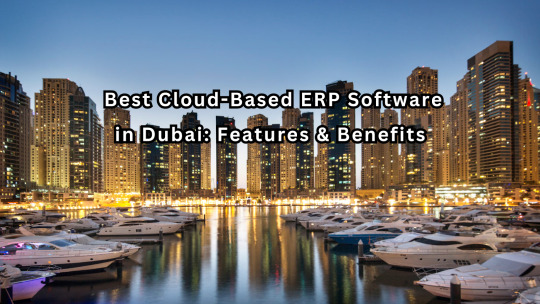
Best Cloud-Based ERP Software in Dubai: Features & Benefits
Introduction
In today's fast-paced business environment, companies in Dubai are increasingly turning to cloud-based ERP software to streamline operations, enhance productivity, and ensure scalability. Cloud ERP solutions offer businesses the flexibility to manage their resources effectively while reducing IT infrastructure costs. This blog explores the best cloud-based ERP software in Dubai, highlighting key features and benefits to help you make an informed decision.
Why Choose Cloud-Based ERP Software in Dubai?
Cloud-based ERP software provides businesses with a comprehensive solution to manage various functions, including finance, supply chain, human resources, and customer relationship management. Unlike traditional on-premise ERP systems, cloud ERP is hosted on remote servers, offering several advantages such as:
Cost Efficiency – No need for expensive hardware or extensive IT support.
Scalability – Easily scales with your business growth.
Accessibility – Allows remote access from anywhere, enabling work-from-anywhere models.
Security – Data encryption and regular updates ensure enhanced security.
Real-Time Insights – Provides real-time analytics and reporting for better decision-making.
Top Features of the Best Cloud-Based ERP Software in Dubai
When selecting the best cloud-based ERP solution, consider the following essential features:
1. Financial Management
Automated accounting and bookkeeping
Tax compliance, including VAT regulations in the UAE
Budgeting and forecasting tools
2. Inventory and Supply Chain Management
Real-time inventory tracking
Automated stock replenishment
Supplier and vendor management
3. Customer Relationship Management (CRM)
Integrated customer data and analytics
Sales automation and tracking
Personalized marketing tools
4. Human Resource Management (HRM)
Payroll automation and compliance
Employee self-service portals
Performance tracking and appraisal management
5. Business Intelligence and Reporting
AI-driven analytics and insights
Customizable dashboards
Predictive analytics for better decision-making
6. Compliance and Security
Data encryption and access control
Regulatory compliance with Dubai’s business laws
Automatic software updates and backup management
Benefits of Implementing Cloud-Based ERP Software
1. Cost Savings
Cloud ERP eliminates the need for expensive IT infrastructure, reducing capital expenditures while offering a subscription-based model.
2. Improved Efficiency and Productivity
Automation of business processes minimizes manual errors and speeds up workflows, allowing employees to focus on strategic tasks.
3. Enhanced Data Security
With advanced encryption, multi-factor authentication, and secure backups, cloud ERP systems protect businesses from cyber threats.
4. Business Continuity and Disaster Recovery
Cloud-based solutions ensure data is securely stored and can be recovered quickly in case of system failures or emergencies.
5. Seamless Integration with Other Business Applications
Most cloud ERP solutions integrate with third-party applications such as eCommerce platforms, payment gateways, and communication tools.
Conclusion
Adopting cloud-based ERP software in Dubai is a strategic move for businesses aiming for growth, efficiency, and cost-effectiveness. Whether you run a small enterprise or a large corporation, investing in the Best ERP Software Dubai will help you stay competitive in the evolving digital landscape. If you are looking for the best cloud ERP system tailored to your business needs, consult with industry experts to find the most suitable solution.
Are you ready to take your business to the next level with cloud-based ERP? Contact us today to explore the best options available!
0 notes
Text
Multi-Vendor Shopping Cart Software | Ecommerce Development Services
FlightsLogic is the best multi-vendor shopping cart software development company, we develop online carts with a variety of platforms depending on the needs of the client. Starting from inventory tools to fully customizable options, we offer our clients total control over their products ensuring the most effective online store for their business.
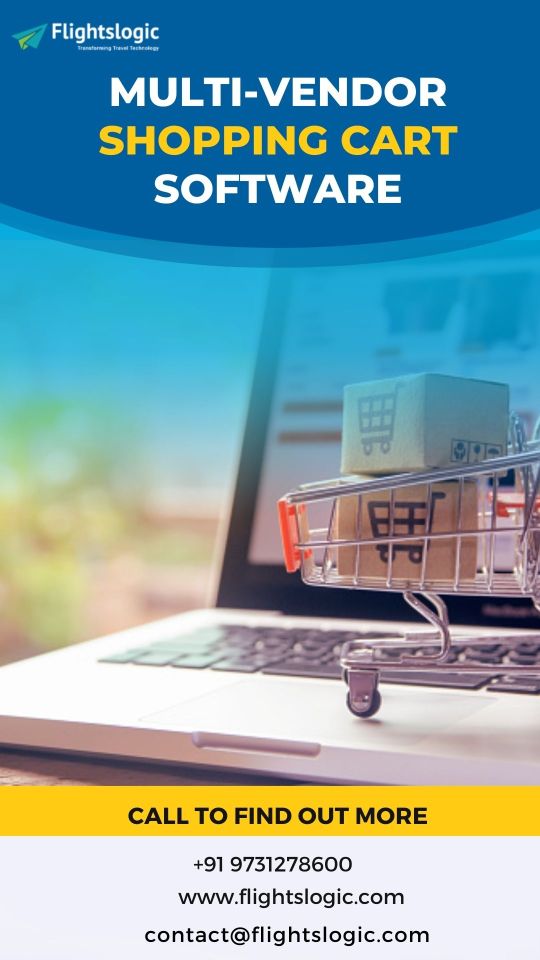
FlightsLogic is a complete solution for shopping cart software that displays a unified and stunning storefront to the customers and gains their complete attention. Skyrocket your revenue with the comprehensive features of FlightsLogic. This mobile-ready shopping cart website gives an awesome shopping experience to your customers.
Our multi-vendor shopping cart development solution is available to large enterprises, SMBs, and small business websites. If you are in search of reliable, effective, and customized shopping cart solutions, we are here to help.
Our main aim is to help clients reap the maximum benefits of an online store. As a web designing company, FlightsLogic offers custom eCommerce development services to help your online business reach new heights.
We have a dedicated team of experienced web designers, developers, and programmers who build appealing shopping cart websites for clients. Our software outsourcing company offers custom web solutions that are cost-effective and high-performing. They help the clients get the maximum ROI.
0 notes
Text
Ecommerce Website Development Company in Delhi
Boost your online business with Nibble Software, a leading eCommerce website development company in Delhi. We specialize in building custom, scalable, and feature-rich eCommerce websites tailored to your business needs. Our expert developers use the latest technologies like WooCommerce, Magento, Shopify, and custom PHP solutions to create seamless, secure, and user-friendly online stores. From intuitive UI/UX design and payment gateway integration to mobile responsiveness and SEO optimization, we provide end-to-end eCommerce solutions that drive sales and enhance customer experience. Partner with Nibble Software for a high-performing eCommerce website that sets your brand apart in the digital marketplace.
For more information visit on:-

#Nibble Software#Ecommerce Website Development Company in Delhi#Ecommerce Website Development#Website Development
0 notes
Text
Build a High-Performing eCommerce Store with Experts!
🛍️ Looking for a reliable eCommerce web development company? We provide custom eCommerce development services to build feature-rich, high-performing online stores that enhance customer engagement and maximize sales.
📦 Our Services Include:✔️ eCommerce website development services for B2B & B2C businesses ✔️ Scalable eCommerce web solutions with seamless payment integration ✔️ Secure eCommerce software solution with multi-vendor support ✔️ Mobile-friendly eCommerce application development🚀 Launch your online store today with expert eCommerce developers!
0 notes
Text
Easy-to-Integrate Payout API
Aeps api
Laraware Private Limited is a dynamic software development company based in Uttar Pradesh, India, specializing in AI-driven solutions across fintech, eCommerce, and education sectors. Established on April 25, 2023, by visionary entrepreneur Anvesh Tiwari, Laraware has rapidly emerged as a leader in integrating advanced artificial intelligence into practical applications, empowering businesses to enhance efficiency and drive growth.
Company Details
Founding Vision and Leadership
The inception of Laraware traces back to 2018 when Anvesh Tiwari, an MTech graduate, embarked on his journey as a freelance software developer focusing on financial technology solutions. His dedication and innovative approach led to the establishment of Laraware, transforming it into a comprehensive technological powerhouse. Under Tiwari's leadership, the company has developed over 5,000 web applications, serving more than 1,000 clients globally.
venturecompanynews.com
Core Services and Solutions
Laraware's portfolio encompasses a range of AI-powered services tailored to meet the evolving needs of various industries:
Fintech Solutions: The company offers digital payment systems, banking and financial automation, fraud detection, risk management, and API-based fintech integrations. These solutions are designed to enhance transaction security and streamline financial operations.
eCommerce Solutions: Laraware develops custom eCommerce platforms, integrates AI-powered recommendation systems, builds multi-vendor marketplaces, and provides payment and logistics integration services. These offerings aim to boost sales and enhance user experiences for online businesses.
School Management Software: The company provides comprehensive software solutions for educational institutions, including student and faculty management, AI-based performance tracking, online classes and examination modules, and parent-teacher communication systems. These tools facilitate efficient school administration and improved educational outcomes.
Innovative Approach and Technological Expertise
At the heart of Laraware's success is its commitment to innovation and technological excellence. The company has developed over 50 in-house AI tools aimed at automating fintech processes, enhancing eCommerce experiences, and optimizing school management systems. Additionally, Laraware has implemented more than 20 advanced security tools to ensure safe transactions, fraud prevention, and cybersecurity excellence.
Client-Centric Philosophy and Global Reach
Laraware's client-centric approach has earned the trust of over 1,000 businesses worldwide. The company's solutions are characterized by their scalability, security, and intelligence, making them adaptable to diverse business needs. By blending cutting-edge technology with innovative thinking, Laraware empowers businesses to embrace digital transformation and achieve sustainable growth.
0 notes
Text
ERP Implementation Cost in India: A Complete Breakdown

Enterprise Resource Planning (ERP) software is a critical investment for businesses looking to streamline operations, enhance efficiency, and scale effectively. However, one of the primary concerns for businesses in India is the cost of ERP implementation. The total cost depends on multiple factors, including the type of ERP, deployment model, customization, and ongoing maintenance. This blog provides a detailed breakdown of ERP implementation costs in India to help businesses make informed decisions.
1. Key Factors Affecting ERP Implementation Cost in India
A. Type of ERP Solution
On-Premise ERP — Higher initial cost due to infrastructure, license fees, and IT setup.
Cloud-Based ERP (SaaS) — Lower upfront cost, but recurring subscription fees apply.
Hybrid ERP — A combination of both, offering flexibility but variable costs.
Businesses looking for the Best ERP Solutions in India must evaluate these options based on their operational needs and budget constraints.
B. Business Size and Complexity
Small businesses: Require basic modules, leading to lower costs.
Medium-sized businesses: Need more customization, increasing implementation costs.
Large enterprises: Complex integrations and multi-location deployment result in higher costs.
For industries like manufacturing, choosing the Best ERP Software for Manufacturing Industry ensures seamless production planning, inventory control, and supply chain management.
C. Number of Users and Licenses
Many ERP vendors charge per-user license fees, impacting overall costs.
D. Customization and Integration Needs
Out-of-the-box ERP solutions are more affordable.
Customization, third-party integrations (CRM, eCommerce, Payroll, etc.), and data migration increase costs.
E. Training and Change Management
Employee training and adapting to ERP workflows involve additional costs.
F. Implementation Partner
Choosing an ERP vendor or third-party consultant affects costs based on expertise, service quality, and support
Working with the Best ERP Software Company India can significantly impact the success of implementation by providing expert guidance and minimizing potential issues.
2. ERP Implementation Cost Breakdown in India
The total cost of ERP implementation in India varies based on multiple factors, including the software license fees, infrastructure requirements, customization, and ongoing maintenance. Here’s a breakdown of key cost components:
Software License Fees: Costs range from ₹1,00,000 to ₹50,00,000 or more, depending on the number of users and modules required.
Infrastructure (On-Premise ERP): Setting up on-premise ERP requires ₹5,00,000 to ₹50,00,000 for hardware, servers, and networking setup.
Cloud Subscription (SaaS ERP): Subscription-based ERP systems range from ₹5,000 to ₹1,00,000 per month, depending on the features and usage.
Customization & Integration: If businesses require advanced customizations or third-party integrations, the cost can range between ₹1,00,000 and ₹20,00,000.
Implementation & Consulting: Hiring ERP consultants and implementation teams can cost anywhere from ₹2,00,000 to ₹1,00,00,000, depending on the project’s size and complexity.
Data Migration: Transferring existing business data to the new ERP system can cost between ₹50,000 and ₹10,00,000, based on data volume and complexity.
Training & Support: Employee training costs range from ₹50,000 to ₹5,00,000, ensuring smooth adoption of the ERP system.
Maintenance & Upgrades: Post-implementation maintenance and periodic upgrades may cost around ₹1,00,000 to ₹10,00,000 annually.
Note: These costs vary based on the chosen vendor, level of customization, and business size.
3. Hidden Costs to Consider
Downtime Costs — Business disruptions during ERP implementation can lead to financial loss.
Data Cleaning & Preparation — Ensuring data accuracy before migration adds extra costs.
Post-Implementation Support — Ongoing support and bug fixes may require additional payments.
Regulatory Compliance — Adapting ERP to Indian tax laws (GST, TDS, etc.) may need further configuration.
4. Cost Comparison: Indian vs. Global ERP Implementation
ERP implementation in India is significantly more cost-effective compared to global markets. While software license fees in India start from ₹1,00,000, global ERP licenses may begin at $1,000 or more. Similarly, implementation costs in India can range from ₹2,00,000 to ₹1 crore, whereas global markets may charge between $10,000 and $500,000. Customization, training, and support expenses are also more affordable in India, making it a highly competitive market for ERP solutions.
5. How to Optimize ERP Implementation Costs in India
Choose the Right ERP — Select between SAP, Oracle, Microsoft Dynamics, Odoo, Tally, Zoho, etc., based on your needs.
Go for Cloud ERP — Reduce infrastructure costs by opting for SaaS-based ERP.
Plan Customization Wisely — Avoid unnecessary customizations that add to cost.
Select a Reliable Implementation Partner — Experienced consultants prevent costly errors.
Invest in Employee Training — Minimize errors and increase efficiency post-implementation.
Negotiate Licensing Fees — Many ERP vendors offer discounts on bulk licenses.
Final Thoughts
The cost of ERP implementation in India varies widely based on the type of ERP, business size, and customization requirements. A well-planned implementation strategy with a focus on optimizing costs can ensure a successful ERP deployment without overspending. Businesses must evaluate their needs, choose the right ERP solution, and work with a reliable implementation partner to maximize their return on investment.
0 notes